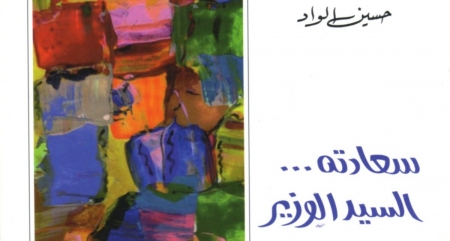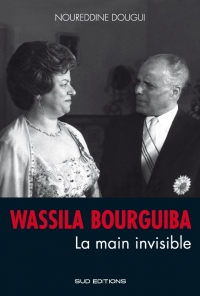Saadatouhou Essaid Elwazir (His Excellency Mr. the Minister)
Saadatouhou Essaid Elwazir (His Excellency Mr. the Minister) is a new novel written by Houcine El Wad (or Houcine El Oued), published by Dar El Janoub Editions (Sud Éditions, Tunis) in 268 pages of medium size under the series “Ouyoun El Mouassira” (Contemporary Gists) which is run by Professor Taoufik Baccar, and introduced by university professor and researcher Chokri El Mabkhout
His Excellency Mr. the Minister reveals the radical collusion between the capital, the body, and politics which, according to El Mabkhout, “are three hypostases that make transparent a disguised and propagated corruption that originated from an incestuous union, though ambiguous and equivocal, between the desire for easy money, sex addiction, and lust for power.Animals that enslaved each other and that lean towards the perpetuation of enslaving the human race in the whole world, either in an explicit and naked manner as is the case in our Arab lands, my country and the like, or generally in an implicit and gentle manner as is the case in those countries that made their counter powers and are still fine-tuning them according to the existing authorities’ deceit and maneuver.”
Dr. Houcine El Wad is a teacher of literature and criticism. He was born in Moknine in 1948. He obtained a State Doctorate in Arab Literatures from the Tunisian university in 1987. He taught in the department of Arabic language in the Faculty of Arts in King Saud University. He also worked as a director of Institut Bourguiba des Langues Vivantes in Tunis (Bourguiba Institute of Modern Languages), a general secretary of the national committee, UNESCO, ALECSO, and ISESCO, and a dean of the Faculty of Arts and Humanities of Kairouan. He wrote many books and he is the director of the series Mafatih (Keys) issued by Dar El Janoub Editions. He wrote many books about old and modern Arabic literature, and modern methodologies, for instance, (al binyatou alqasassiya fi Risalat al-ghufran) The Fictional Structure in The Epistle of Forgiveness (1972), (fi tarikh al-adab: mafahim wa manahij) (On the History of Literature: Concepts and Methodologies) (1979), (fi manahij addirassat al-adabiyya) (On the Methodologies of Literary Studies) (1982), (Al-Moutanabbi wa attajribatou aljamaliyya inda alarab) Al Moutanabbi and the Aesthetic Experience of Arabs (1987), (madkhal ila shir al Moutanabbi) An Introduction to Al Moutanabbi’s Poetry (1991), (Dirastoun fi shir Bashar) A Study about Bashar’s Poetry (1992), (al lougatou ashir fi diwan abi Tammam) Language Poetry in Abu Tammam’s Poetry Book (1999), (jamaliyyatou alana fi shir Al-Asha al Kabir) The Aesthetics of the Ego in Al-Asha’s Poetry (2001). He also wrote introductions for other writers’ books and numberless articles in the supplement of Al-3amal (The Action) and Al-Fikr Magazine (Thought Magzine). He was an activist especially between 1972 and 1974 during the emergence of the movement of the literary Avant-gardism. As for the narrative art, his (Rawa-ihou al-Madina) The City’s Scents won the Tunisian Golden Comar in 2011 and it was received with a great appraisal from the intellectuals and critics. Critic Taoufik Baccar said that its style is ranked to the level of world literature which is a rare thing in the national literary production because it epitomises in all its traits all the old Tunisian cities. In it, he described the social environment in its colours and fragments and particularly its scents – be they lovely or stinky because it is the essential element that galvanises the literary text in which scents of mosques, oil mills, souks (traditional markets), and even dirt and brothels throng together, plus the massive use of proverbs by the characters. All that is delivered in the framework of a humourous and sarcastic viewpoint, but at the same time it is not a neutral viewpoint as it is most of the time critical and exasperated.It seems that El Wad’s novel (His Excellency Mr. the Minister) also enjoys a good reception. Professor and Arabic language and literature researcher Chokri El Mabkhout wrote an introduction for it in which he stated that El Wad wrote it years ago before the Tunisian revolution and he was inspired, at the time of its writing, by what was circulated about the state of corruption and thieves, and the scandals of its ministers and their leader and his royal family, leaving the rest, which is the most important in art, to the logic of the story and the novel making. The artistic world which was made by the writer’s imagination seemed similar to faces of reality whose some secrets were divulged by the days, but, according to El Mabkhout, “You will not find in this novel, even if you guess and compare, any minister in person. And I mostly presume that you will keep guessing without reaching any certainty. And it would be difficult for you to delineate this event or that occurrence whatsoever the effort you made. You will only notice the logic of the running of the state—the state of the countries’ looters and sellers, the devastators of minds, and the enslavors of people.” His Excellency Mr. the Minister is a novel which Houcine El Wad wanted it to be a trial of a minister that lawyers refused to defend him due to his dirty files of corruption because he worked in the entourage of “His Excellency.” And perhaps he means by it the ousted president Zine el-Abidine Ben Ali. It depicts some stages of the life of a minister who was a primary school teacher suffering from poverty, deprivation in all its forms, and life’s hardships which chance and greed put him in the position of a minister in a state governed by corruption in which he did nasty jobs and when those jobs were over his master threw him into the cellars of the Interior Ministry, the hecatombs of tribunals, and the abattoir of the madhouse.But, although the novel was written years ago before the revolution of January 14th and the events are similar to what is happening today in Tunisia after the revolution, the difference, as it seems, lies in the fact that some lawyers after the revolution do not refuse to defend the corruptors who were involved in bribery and even some of them are rushing to defend the remnants of the former regime and not only the minister or even the biggest symbol of corruption in the corrupt state.



 تحميل قائمة المنشورات
تحميل قائمة المنشورات